5 Best Grass Types for Louisville
BY RELA CATUCOD | APRIL 9TH, 2023 | KENTUCKY, LAWN CARE, LOUISVILLEIs your Louisville lawn in need of a makeover to impress guests during summer get-togethers or Kentucky Derby watch parties? Selecting the best grass type is crucial for cultivating an attractive, resilient lawn that endures high foot traffic and Kentucky’s distinct climate. In this article, discover the best grass types for Louisville yards to elevate your outdoor space.
Derby City’s temperate climate, with hot summers and cold winters, falls within the transition zone, making it suitable for both cool-season and warm-season grasses. We’ll examine five exceptional choices: Kentucky bluegrass, perennial ryegrass, tall fescue, Zoysiagrass, and bermudagrass.
Warm-Season vs. Cool-Season Grasses
When it comes to selecting the best grass types for your Louisville lawn, understanding the difference between warm-season and cool-season grasses is crucial. Warm-season grasses thrive in hot temperatures and are dormant during cooler months. Cool-season grasses flourish in milder temperatures and enter dormancy during summer and extremely cold winters.
Homeowners in Louisville should consider their region’s climate and the specific needs of their lawn before choosing a grass type. For a lush and healthy lawn, cool-season grasses like Kentucky bluegrass and tall fescue are popular choices, as they are well-adapted to the local climate and can handle the seasonal temperature fluctuations experienced in the area.
5 Best Grasses for Louisville
Louisville offers a unique opportunity for both cool-season and warm-season grasses to flourish. Cool-season varieties thrive in early spring and fall, while warm-season grasses excel in the warmer months. This versatility allows homeowners to find the perfect balance for their lawn in Derby City, ensuring a lush and healthy appearance even during occasional frost and cold snaps.
1. Kentucky Bluegrass
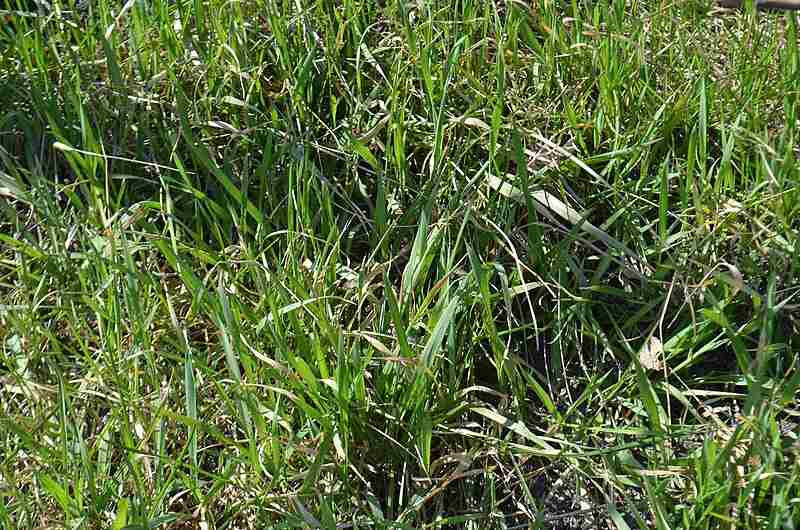
Photo Credit: Ethan2039 / Wikimedia Commons / CC BY-SA 4.0
Kentucky bluegrass is a top choice for homeowners in Louisville who appreciate its durability. Perfect for backyard gatherings during the Kentucky Derby season or for families with children who enjoy outdoor play, this grass type is well-regarded for its moderate resistance to wear and tear. The strong, dense turf formed by Kentucky bluegrass helps it recover quickly from damage and maintain its integrity despite heavy foot traffic.
Boasting a vibrant, deep green color, Kentucky bluegrass thrives in full sun exposure. It is less suitable for landscapes with significant shade. As a cool-season grass, it flourishes during the mild temperatures of spring and fall, going dormant in hotter periods.
Keep in mind that this grass will demand considerable attention as temperatures rise. To keep Kentucky bluegrass at its best, it requires a high level of maintenance, including regular mowing, watering, and fertilizer.
Classification: Cool-season grass
Spreads by: Rhizomes
Shade tolerance: Low
Drought resistance: Moderate
Foot traffic tolerance: Moderate
Maintenance needs: High; requires regular mowing, fertilization, and irrigation
Mowing height: Set mowing height between 2.5 inches and 3.5 inches
Potential for disease: Moderate; prone to leaf spot, dollar spot, and summer patch
Potential for pests: Moderate; prone to sod webworms, aphids, thrips, and leafhoppers
Soil pH: 6 to 7.5
Soil type: Well-draining, fertile soils
Other notes: Kentucky bluegrass is great for homeowners seeking a high-maintenance yet attractive lawn. For optimal results, it is recommended to mix Kentucky bluegrass with other cool-season grasses.
2. Perennial Ryegrass
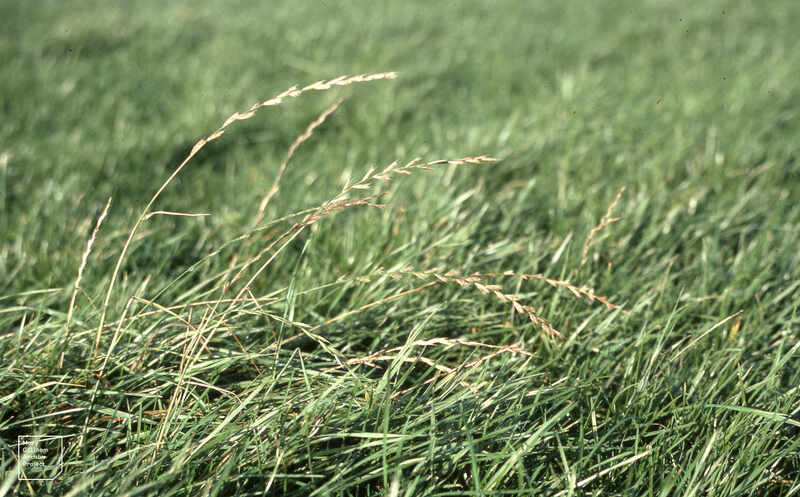
Photo Credit: Dr Mary Gillham Archive Project / Flickr / CC BY 2.0
Perennial ryegrass, with its fine leaf texture and dark green color, is a fantastic option for Louisville homeowners seeking a lawn that is both attractive and low-maintenance. Its rapid germination (five to seven days) and excellent seedling vigor make it an ideal choice for those looking to establish a new lawn quickly or fill in bare spots with minimal soil preparation, just in time for the next Derby season or backyard barbecue.
This grass type boasts high traffic tolerance and can even outcompete some weed species, making it well-suited for Louisville yards with frequent foot traffic or active children. However, it is essential to note that perennial ryegrass requires a sharp mower for easy mowing and needs summer irrigation to withstand the region’s hot, humid climate.
Classification: Cool-season grass
Spreads by: Bunching
Shade tolerance: Low
Drought resistance: Low
Foot traffic tolerance: High
Maintenance needs: Moderate; regular mowing and fertilization are necessary
Mowing height: Set mowing height to 1.5 to 2.5 inches
Potential for disease: High; prone to gray leaf spot, red thread, and leaf spot/melting-out
Potential for pests: Moderate; prone to ants, sod webworm, thrips, and white grubs
Soil pH: Can grow in soils with a pH between 5 and 8, but prefers between 6 and 7
Soil type: Prefers good drainage and fertility, but can tolerate some poor drainage
Other notes: Perennial ryegrass is known for its ability to tolerate low mowing, making it a suitable choice for homeowners who prefer a shorter, well-manicured lawn. Despite its many positive qualities, this grass type does have some drawbacks; it has limited heat tolerance, which can pose challenges during Louisville’s hot summers.
3. Tall Fescue
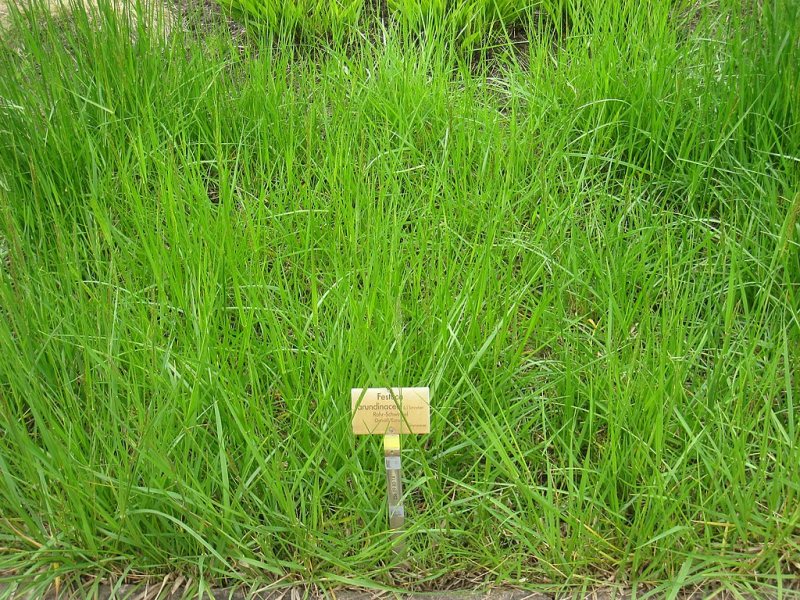
Photo Credit: Daderot / Wikimedia Commons / Public Domain
Tall fescue is an excellent grass type for Louisville homeowners seeking a versatile and low-maintenance lawn. It’s also the most heat tolerant cool-season grass, perfect for Jefferson County lawns. Adaptable to various soil types, from heavy clay to sandy soils, and thriving in both full sun and medium shade, tall fescue is well-suited to the diverse landscapes of Kentucky.
Homeowners will appreciate tall fescue’s good traffic tolerance and minimal irrigation requirements, making it perfect for busy outdoor spaces and conserving water during drier periods. While it may need more frequent mowing to maintain its best appearance, its natural resistance to insects, competitiveness against weeds, and minimal thatch buildup make it a practical choice for a beautiful, hassle-free lawn.
Classification: Cool-season grass
Spreads by: Produces short rhizomes but has a bunch-type growth habit
Shade tolerance: Moderate
Drought resistance: Moderate to High
Foot traffic tolerance: Moderate
Maintenance needs: Moderate; requires frequent mowing
Mowing height: Set mowing height to 2 inches when grass reaches 3 inches tall
Potential for disease: Low; tolerant of most diseases when properly maintained
Potential for pests: Moderate; prone to armyworms, white grubs, and cutworms
Soil pH: 5.5 to 6.5
Soil type: Adaptable to various soil types, but prefers clay soils with good drainage
Other notes: Tall fescue exhibits limited lateral spread, meaning it has a slower recovery rate from damage compared to other grass types. Overseeding can help improve the lawn’s density and overall appearance if needed.
4. Zoysiagrass
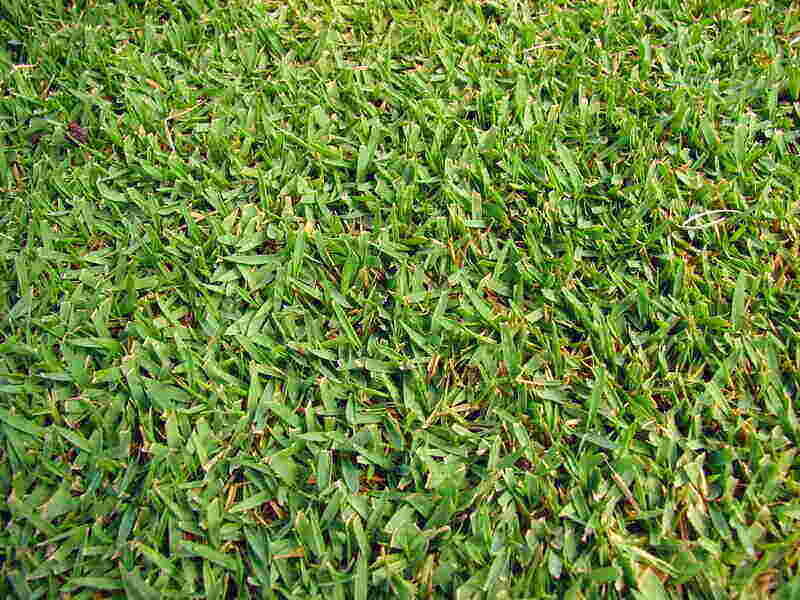
Photo Credit: Forest & Kim Starr / Wikimedia Commons / CC BY 3.0
Zoysiagrass, recognized for its fine to medium leaf texture and dense growth, presents a fantastic alternative for Louisville residents who desire an eye-catching and hardy lawn. Its relatively low water and nutrient requirements make it a practical choice for those looking to conserve resources while maintaining a lush, green turf that’s perfect for Kentucky’s warm summer months or outdoor gatherings.
This grass variety boasts remarkable heat and drought tolerance, which serves Louisville lawns well during sweltering conditions. Additionally, Zoysiagrass is well-equipped to withstand high foot traffic, making it an excellent option for homes with active families or pets. However, it is vital to remember that Zoysiagrass grows more slowly than other grass types and requires patience when establishing a new lawn or filling in bare spots.
Classification: Warm-season grass
Spreads by: Rhizomes and stolons
Shade tolerance: Moderate
Drought resistance: Moderate to High
Foot traffic tolerance: High
Maintenance needs: Low nitrogen fertilization requirements, although, it’s prone to thatch build-up.
Mowing height: Set mowing height between 1 and 2 inches
Potential for disease: Good disease tolerance overall
Potential for pests: Moderate; grubs can cause serious damage
Soil pH: 6 to 6.5
Soil type: Adaptable to various soil types, prefers well-draining soils
Other notes: Zoysiagrass establishes slowly, so patience is required when starting a new lawn.
5. Bermudagrass
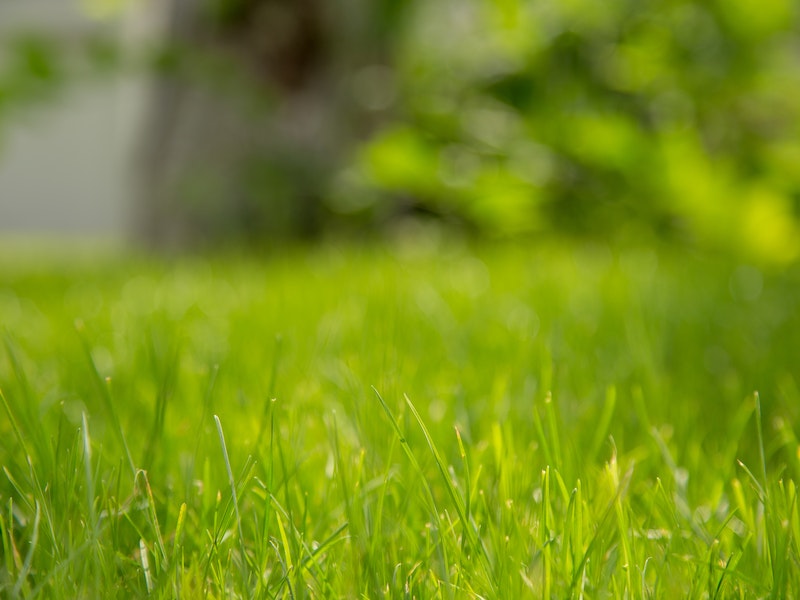
Photo Credit: Pexels
Bermudagrass, with its fine to medium blades and quick growth, is a great pick for Louisville homeowners wanting a resilient and attractive lawn. This grass loves the warm, sunny weather that Kentucky enjoys in the summer, and its fast growth means a thick, green lawn perfect for outdoor fun and relaxation.
Homeowners will appreciate that bermudagrass can handle the heat and dry spells of Louisville summers. Plus, it’s tough enough to stand up to kids and pets playing in the yard. However, remember that bermudagrass needs frequent mowing and care to keep it looking lush and green.
Classification: Warm-season grass
Spreads by: Rhizomes and stolons
Shade tolerance: Low; thrives in full sun
Drought resistance: High
Foot traffic tolerance: High
Maintenance needs: Needs frequent mowing due to fast growth rate; develops thatch easily; needs regular fertilization
Mowing height: Set the mowing height between 0.5 and 1.5 inches for hybrid Bermudagrass cultivars. Mow common Bermudagrass down to 1.5 to 2.5 inches.
Potential for disease: Good resistance to disease, although diseases are common
Potential for pests: Low resistance to insects
Soil pH: 6 to 6.5
Soil type: Tolerates most soil types
Other notes: Bermudagrass doesn’t need mowing from October to April, offering homeowners a maintenance break. Be mindful, though, as it can spread into nearby areas and turns brown during dormancy, contrasting with cool-season grasses. It may also be susceptible to winterkill.
FAQ About Louisville Grass Types
Can I mix different grass types for my Louisville lawn?
Yes, mixing different grass types can provide a range of benefits, such as increased disease resistance, improved tolerance to various environmental conditions, and a more uniform appearance. Common mixtures include Kentucky bluegrass and perennial ryegrass.
Water your lawn about 1 inch per week, either through rainfall or supplemental irrigation. Water deeply and infrequently, allowing the soil to dry between watering sessions to encourage deep root growth.
The best time to seed cool-season grasses in Louisville is during early fall when temperatures are cooler, and there is more moisture in the soil. You can also seed in early spring, but fall seeding typically produces better results.
The best time to seed warm-season grasses in Louisville is during late spring or early summer.
For most cool-season grasses, it’s best to fertilize in the fall to avoid promoting fast growth that could be harmed by summer heat. Remember to be cautious with the amount of fertilizer you use, as excessive amounts can lead to excessive growth at the expense of the delicate roots.
The best time to fertilize warm-season grasses is in summer.
Choose Plant and Grass Varieties for Your Louisville Landscape
When planning your landscape, consider incorporating native plants and other low-maintenance landscaping options. Native plants typically require less maintenance, are more resistant to pests and diseases, and provide essential habitat for local wildlife.
Before choosing a grass type, consider these factors:
- Climate and seasonal conditions in Louisville
- Water requirements and drought tolerance
- Foot traffic and wear resistance
- Shade tolerance
- Maintenance needs
By carefully selecting plant and grass varieties suited to the Louisville climate and your specific landscape conditions, you can create a thriving, low-maintenance, and ecologically friendly outdoor space.
Contact a Louisville lawn care pro today to help improve your yard, making it a comfortable space for your family and friends.
Main Image Credit: KamRaMan64 / Wikimedia Commons / CC BY-SA 4.0